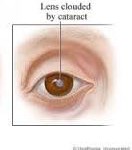Several people have asked me about their cataracts recently, and whether my work as a natural vision teacher could help them. A cataract is a clouding of the crystalline lens of the eye. The lens is formed of many fine layers of normally clear flexible material. It bulges to a more rounded shape when looking up close, then flattens when looking farther away. When I read Dr. Bates’ classic book for the first time many years ago, his story of the fish made a huge impression on me. He squeezed a living fish eye with his fingers and saw the lens become visibly cloudy from the strain! Then he relaxed the pressure, and the lens became clear again. The book includes a grainy black and white photo. I was completely convinced by this: straining the lens of the eye causes cataracts. QED! (QED is Latin for “quod erat demonstrandum”, meaning “Thus it is proven” and is used in mathematical proofs. I was a math major in college.)
Dr. Bates has written about patients whose cataracts lessened or disappeared with his relaxation therapy, and modern vision teachers have seen this as well. It stands to reason that if strain causes a problem, removing the strain will let the problem start to heal. So standard Bates techniques like palming or the Long Swing will likely be a big help to relieving the strain leading to cataracts, as will discarding too-strong glasses.
Vitamin C supplementation has been suggested for supporting cataract healing, with some vitamin C-rich eye drops being sold for this purpose. The concentration of vitamin C in the lens of the eye is higher than anywhere else in the human body. Since vitamin C is eaten up by stress, during periods of illness or unusual pressure in your life you might want to take a little extra.
Colorado vision teacher Greg Marsh gives this lens flexibility visualization exercise. Close your eyes and relax, taking a deep slow breath to settle yourself. As you breathe in again, imagine your lens swelling up and getting fatter while you think of looking at something close. As you slowly exhale and think of looking farther away from you, imagine your lens getting flatter. Breathe in, look close, lens fattens; breathe out, look far, lens flattens. This should be gentle and peaceful, like gills moving on a fish. See your lenses as moist and flexible throughout this.
If you do opt for cataract replacement surgery, be aware that this is the most common surgery performed in the US, pretty much tried and true. Originally lenses from a cadaver (dead person) were used. Now replacement lenses are plastic, and unfortunately often come with a prescription. To me this is like wearing glasses which you can’t remove, giving your natural vision no room to improve on its own. The eye doctor may think he is helping you by recommending this, but I’d be cautious, and choose clear (no prescription) replacement lenses if you have to go this route. If the prescription isn’t perfect or is too strong, you can’t remove it.
For anyone who is worried about cataracts, I’d suggest visualizing your lenses as flexible and fluid, easily taking in nutrients and releasing waste, breathing in and out like little pearl onions in the Greg Marsh exercise above. The body believes these mental images, so I’d rather have you see your lens as moist and healthy than “as hard as stone” which some people’s eye doctors have told them! One of my teachers calls this a “medical hex”, and unfortunately we often take to heart such negative messages.
It’s so much more life-affirming and health-affirming to see yourself as vibrant and clear-sighted! I tell my clients to put that positive picture out there in front of them, like a dream they want to come true, then walk into it, making it their reality.
I wore strong glasses, then contact lenses, from age 5 into my 40s. While making many mistakes, eventually l learned how to improve the way I use my eyes and to see in a more relaxed, healthy manner. It is my pleasure to coach others to do the same. Visit me at https://NancyLNeff.com.


Cataracts were diagnosed last January and the optician expected me to be ready for surgery next month (a year later). I really don’t like the idea, having avoided wearing glasses since I became myopic in my late 20s. I am now 63. I believe better vision is possible, but I’m a writer — and when I’m not writing, I’m reading obsessively. I have a lot of psychic/emotional issues. Any suggestions?
Vicky, cataracts, like most if not all vision restrictions, come from straining to see. You can read with strain, or without. You can write with strain, or without it. You might need to look in the distance more, or go for walks outside regularly where you’re looking around at the scenery instead of having your face in the computer or your nose in a book. However I’m guessing you really need to learn to relax more, and to develop some coping mechanisms for those psychic/emotional issues. I’ve had a lot of energy medicine training as well as the vision improvement experience, and would love to work with you formally if you’re interested. This form (http://nancylneff.com/vision_session_form.htm) is the 1st step for setting up a session with me. When I receive it, I’ll contact you with some choices of times we can meet over Skype or Zoom. Lastly, there is hope! Believe in the healing power of your wonderful vibrant eyes.
I used to be short-sighted as a teenager- wore contacts, then 1995 – got the RK – radial keratotomy- and my eyes were great until past year or so – my vision is blurry in the morning and improves during the day, but past few months, it’s all worse – always wear sunglasses – the optician said I have dry eye due to RK- and have these cataracts – which freaks me out – going blind has always been my greatest fear, since I was a little kid and Mary from Little House went blind! I’ll give the visualisation exercise a go – I have been picturing violet 6th chakra energy cleaning my lens!!! Thank you – Yvonne
Yvonne, you aren’t the first person who told me Mary from Little House going blind got stuck in her head, and made her fearful of the same thing happening. The things we do to ourselves! 🙂 Can you replace it with a movie of your sight getting better? Also, here’s something I wrote about Dry Eye, which might help. https://www.iblindness.org/655/understanding-dry-eye/
Thank you Nancy, The article gives me lots to think about.
Trish, great! That was my goal in writing it. 🙂
Naomi, thanks. When I first heard the warnings to not look at the sun or you’ll get cataracts, I wondered if they expected people to be looking at the sun while wearing glasses. When I wore strong contacts years ago, being outdoors in full sunlight seemed so glaringly bright it was painful.
I heard years ago that not wearing UV protective sunglasses on a sunny day is a factor in cataract formation. That makes sense and is in line with your article. Being out in bright summer sun, especially in a city where the sun glares off glass windows and light colored concrete, is a form of eyestrain. Very interesting. All of this.
Good article Nancy! I like the warning about the artificial lens.
One thing many people, usually the seniors say; they regret having the artificial lens with prescription placed in the eye after cataract surgery. They are usually given option for a lens prescription for distance or close and have to wear glasses for the other distance.
The artificial plastic lens with the set prescription causes the vision to become more impaired (like glasses);
more impairment=the lens is then too weak=vision is blurred.
If they try to practice Natural Eyesight Improvement the vision improves BUT; the lens is now too weak=vision is blurred.
In either case; the vision becomes unclear because the eye is looking through an incorrect prescription inside the eye. They cannot remove it. Only way to fix this; more eye operations. Is this what doctors are secretly hoping for? $$
Also; Plastic is toxic; the artificial lens is placing poison directly inside the eye.
I read that some doctors are working on making a lens that bends like the real human lens. Maybe they will go back to using a lens from the deceased. Or even grow one from DNA, Stem Cells! Then it might be attached into the eye as it naturally should be and it will bend, accommodate, un-accommodate.